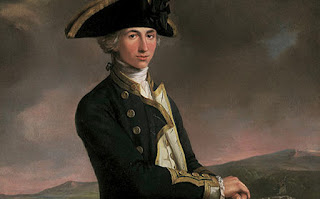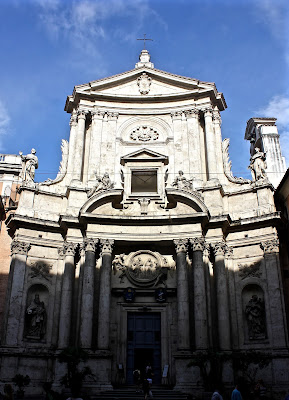The Italians and the English, an affection running deep.
Ever since the 1340s, when Edward III sunk the Florentine economy while not being able to repay his debts to the Peruzzi and Bardi banking families who were financing the Hundred Years' War, causing a rather strong financial crisis, the English have more than made up for that little muddle with this peninsula. Indeed, our relationship is perhaps one of the best in Europe; yes, we were at war in WW2, though many Italians weren't really up for standing against their old allies of many conflicts, including the Great War, we are much more thankful for the Anglo-American liberation of Italy, and how not to appreciate those wonderful, romantic films such as Room with a View or Tea with Mussolini - the stories of Medieval and Renaissance clergymen and noblemen residing here are infinite, the Stuart monarchs even had Italian blood in them, since the 18th century cities such as Rome and Florence developed huge expat communities ever since the Grand Tour, with churches, tea rooms and much more, while taking the arts, literature and architecture of Rome back to Britain, where geniuses such as Christopher Wren reinvented them. So what do we owe Britain? You know what? What is it that unites us? Might it actually be the French? Despite my deep affection for the Bourbonic cause of the French monarchy and a possible restoration. I believe it is definitely the French that unite us. How?
Napoleon Bonaparte (1769–1821) was born to nobleman Carlo Maria di Buonaparte and Maria Letizia Ramolino in Ajaccio, Corsica, a year before the island was transferred to France from Genoa. Considering that the Italian unification didn’t fully occur until 1870 and that he himself considered himself a Frenchman and a child of the much misunderstood but very bloody first French revolution, there is no reason to think of him as an Italian, moreover as he invaded and occupied Italy for several years in what can be considered an early form of military dictatorship. He wanted to be French but as a classical heir of the Roman Empire and the Italian Renaissance. Now, what he did do during his time in Italy?
Let’s debunk a myth first; the famous Mona Lisa by Leonardo at the Louvre, was the only Italian work among those of the great masters to not have been taken into France, as this wonderful portrait of a Florentine noblewoman was taken and completed by Da Vinci in Paris in 1516, and there it was bought by King Francis I of France, an avid art collector. The list ends here!
Now that my conscience has been cleared, I shall go on. Yes, not only Napoleon was an occupier of lands, he was also the first art looter of modern history. His quest for obtaining the best masterpieces of Europe can be resumed into one of his quotes: We will now have all that is beautiful in Italy except for a few objects in Turin and Naples. His intent was that of shaming the Italian states: Italy owes art its great fame and wealth, but it’s come the time to move everything to France, the land of the free. Of course, he also “took possession” of several works throughout Europe, many of the religious art he seized from churches, monasteries and cathedrals now forms the backbone of the French national galleries, a comprehensive list would be unnecessarily long, needless to say, it would comprise works of the caliber of Rubens and Rembrandt, his systematic appropriation of art can only be compared to that of Nazi Germany over a century later. Of all the works stolen in Italy (thousands), less than half returned after the Battles of Waterloo (1805) and Trafalgar (1815) because of pressure by the British to return them to their rightful owners who sent art experts to Paris to retake possession of the looted masterpieces, among those that remained are magnificent works by Giotto, Fra Angelico, Mantegna, Perugino, Piero di Cosimo and Guido Reni. Ancient Roman statues or masterpieces such as Raphael’s Transfiguration thankfully returned, but these were exceptions. Indeed, a complete list can’t be included here - I will therefore mention one example dear to me.
In 1803, Napoleon’s sister, Paolina Bonaparte, married the extrovert art collector and Roman Prince Camillo Borghese who was born into one of the oldest and richest papal families of the Eternal City, a passionate and good looking man of his time who sadly ended up depressed, as Paolina lived an extravagant life at his expenses, with over 30 known lovers and extravagances such as being carried naked into her bath by her African slaves, knowing well that her husband couldn’t protest much when her brother was occupying Rome - of course, it is far from the historian in me to make any kind of judgement. The situation was quite tragic for the poor Borghese, but at least he had his large art collection to console him, a number of masterpieces accumulated by his family and also new ones he was adding up, such as an erotic naked statue of him by Antonio Canova. What remains of his majestic collection can still be seen in the beautiful Borghese Gallery in Rome. But why did I say what remains? You may wonder. Well, that is because Napoleon, during one of his visits to Rome, the self-proclaimed emperor, bullied the prince and husband of his sister, at the time a highly dishonouring move, into giving France 344 of his best artworks; they included 154 statues, 160 busts, 170 bad-reliefs, 30 columns and vases - they also included some of the most renowned masterpieces of antiquity such as the Ares Borghese, the Antinous Mondragone, the Borghese Hermaphroditus and the Borghese Vase. They were never given back. Now, multiply this with the equation of others not being his sister’s husbands and apply it to the whole of Italy, and to palaces, churches or galleries such as the Horses of San Marco the symbol of Venice, the sensual Apollo of Belvedere from the Vatican Museums or the Portrait of Leo X at the Uffizi and with them, thousands of others. See?
It is true that the French were not the first to take art works, hell, we Romans did it first, but as I like to remember, the English were quite polite and purchased them instead, for example, or at least took the effort to actually discover and preserve them. Do I think they should be returned? Let’s not be silly. Why would I go to Paris for then! Just one thing to say. Good job Admiral Nelson! (No wonder my cat is named after you). This is my favorite example of why we Italians return the favour of this special relationship. As I like to think Italy is an ageing Roman matron but England is her still flourishing young daughter, as Eleanor Lavish put it in Room with a View, quite eloquently: A young girl, transfigured by Italy! And why shouldn't she be transfigured? It happened to the Goths!






